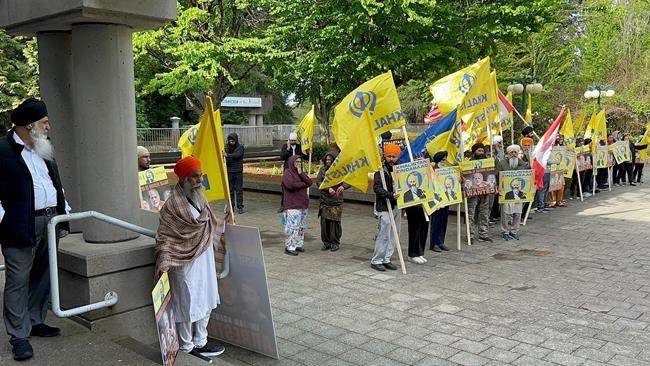SURREY, B.C. — Members of British Columbia's Sikh community filled a Surrey courtroom as three Indian nationals accused of murdering temple leader and political activist Hardeep Singh Nijjar made their first court appearances by video.
Outside Surrey Provincial Court, protesters chanted slogans and waved Sikh independence flags, as well as placards blaming India's government for the killing.
The three suspects — Karan Brar, Karanpreet Singh and Kamalpreet Singh — wore orange jumpsuits and briefly responded to questions from Judge Delaram Jahani in separate appearances.
Brar and Karanpreet Singh agreed through their lawyers to make their next appearances on May 21. By Tuesday afternoon the court had yet to decide on a new date for Kamalpreet Singh while he sought legal representation.
All three men, who were arrested in Edmonton on Friday, face charges of first-degree murder and conspiracy to commit murder in last June's killing of Sikh independence activist Nijjar, which sent Canada's relations with India into disarray.
Jay Michi, the lawyer representing Karanpreet Singh, said the defence is just starting the process of going through a "massive wave" of disclosures from the Crown to determine what would be challenged in court.
"And that's what we'll do," Michi said, adding that his client's nationality should not cloud the process of determining what happened.
"That's what defence counsel's job is: Make sure that everyone gets a fair trial whether or not you're a Canadian citizen. Everyone is entitled to due process protection of our Charter rights and the rule of law, and that's why we're in this business."
Nijjar, who was the president of the Guru Nanak Sikh Gurdwara, was shot dead in his pickup truck while leaving the Surrey temple's parking lot last June. He was a key organizer of unofficial referendums for an independent Sikh state in India and was regarded by India's government as a terrorist.
Last September, Prime Minister Justin Trudeau said there was credible intelligence that India's government was involved in the killing, which India denies.
The public gallery was filled for Tuesday's court appearance, requiring an overflow room to accommodate some observers.
Brar's lawyer, Richard Fowler, said he "completely understands" the high level of public attention.
"That level of community interest makes me even more resolved to ensure that those charged with these offences have a fair trial," Fowler said.
"And I have no doubt that members of the community and the broader Canadian community and the international community are equally interested in ensuring that there is a fair trial."
Fowler said he had worked on a number of homicide cases that "take a significant amount of time to review" and that he understood people may be frustrated by the time it takes to reach a resolution.
"But it is very important that everybody does their work diligently, carefully, and not be influenced by external concerns to ensure that … all of the accused have a fair trial and that ultimately justice is done."
The tensions between India and Canada over Nijjar's killing resulted in the Indian government suspending issuing certain visas to Canadians for about two months and both sides expelling diplomats as relations soured.
In November, prosecutors in the United States said an Indian government official directed a plot to assassinate another prominent Sikh separatist leader and a close friend of Nijjar's who lives in New York City.
Police in B.C. said on Friday that investigations into whether India's government was involved in Nijjar's death are continuing.
This report by The Canadian Press was first published May 7, 2024.
Chuck Chiang, The Canadian Press



